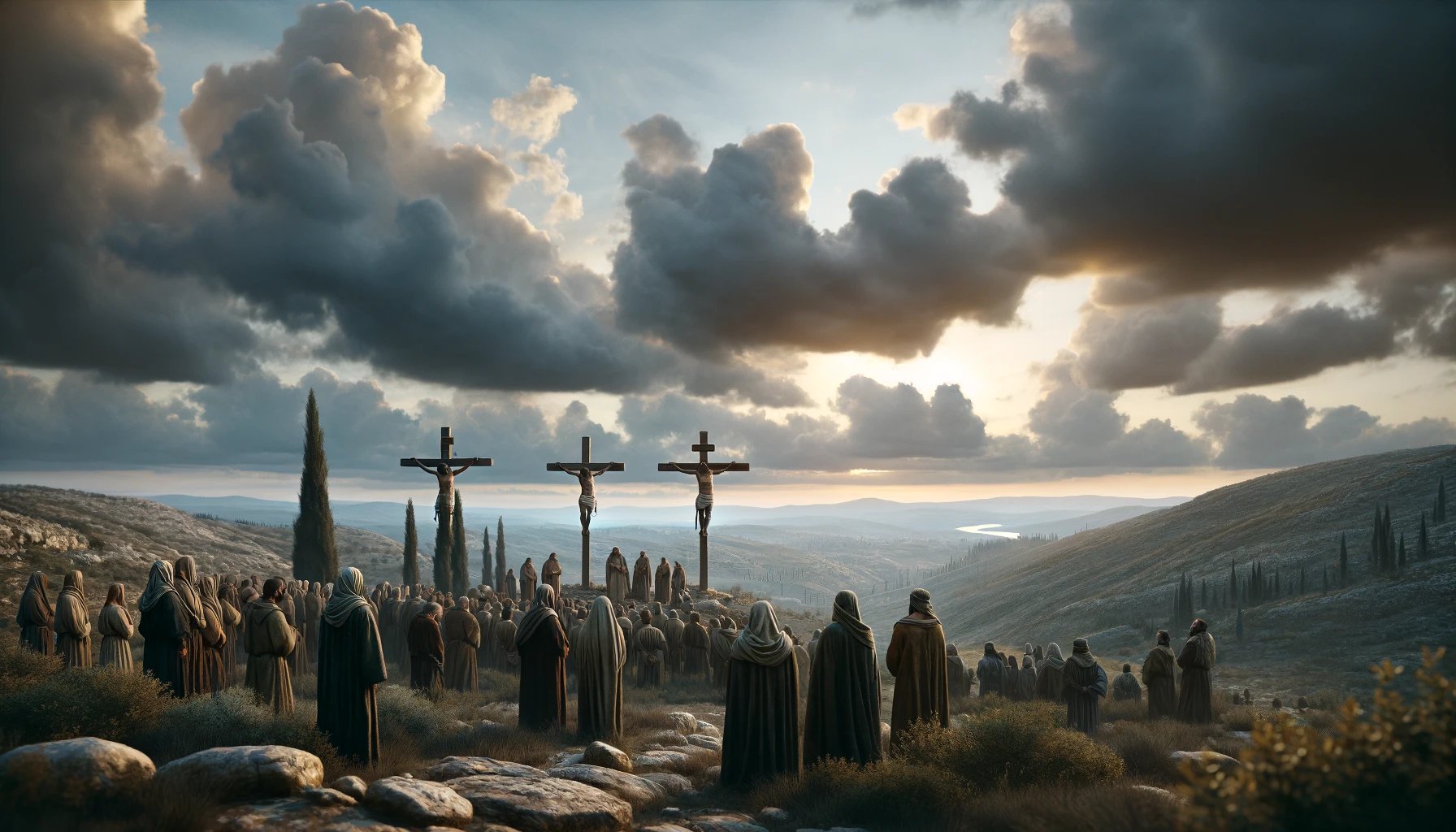Home>Christian Videos>Bible Stories>Where In The Bible Do You Find The Story Of The Death Of Jesus Christ


Bible Stories
Where In The Bible Do You Find The Story Of The Death Of Jesus Christ
Published: March 1, 2024
Ericka Andersen, an editor at Christian.net, expertly merges digital strategy with content creation, focusing on faith and societal issues. Her communication skills enhance the platform's engaging narratives, fostering meaningful dialogue on belief's impact on society.
Discover the powerful story of the death of Jesus Christ in the Bible. Explore the significance and impact of this pivotal event in biblical history. Gain insight into one of the most profound Bible stories.
(Many of the links in this article redirect to a specific reviewed product. Your purchase of these products through affiliate links helps to generate commission for Christian.net, at no extra cost. Learn more)
Table of Contents
Introduction
Where in the Bible do you find the story of the death of Jesus Christ? This is a question that has intrigued and inspired countless individuals throughout history. The death of Jesus is a central event in Christianity, and the Bible provides several accounts of this pivotal moment. From the Gospels to the Book of Revelation, the narrative of Jesus' death and its significance is woven into the fabric of Christian belief and practice. In this article, we will explore the various passages in the Bible that detail the death of Jesus Christ, shedding light on the profound impact of this event within the Christian faith.
The Crucifixion of Jesus in the Gospels
The Gospels, which include the books of Matthew, Mark, Luke, and John, offer detailed accounts of the crucifixion of Jesus Christ. Each Gospel provides a unique perspective on the events leading up to and following Jesus' death. In the Gospel of Matthew, the crucifixion is depicted with a focus on Jesus' trial, crucifixion, and burial. The Gospel of Mark emphasizes the suffering and abandonment of Jesus on the cross, highlighting the profound sacrifice he made for humanity. Luke's Gospel presents a compassionate portrayal of Jesus' crucifixion, emphasizing his forgiveness and concern for others even in the midst of his own suffering. John's Gospel delves into the theological significance of Jesus' death, portraying it as the ultimate expression of God's love for humanity. These accounts collectively offer a comprehensive understanding of the crucifixion of Jesus, illuminating its significance within the Christian faith.
- The Gospel of Matthew provides a detailed narrative of Jesus' trial before Pilate, his crucifixion, and his burial, highlighting the fulfillment of Old Testament prophecies regarding the Messiah.
- In the Gospel of Mark, the crucifixion is depicted with a focus on Jesus' suffering and abandonment, underscoring the depth of his sacrifice for humanity.
- Luke's Gospel presents a compassionate portrayal of Jesus' crucifixion, emphasizing his forgiveness and concern for others even in the midst of his own suffering.
- John's Gospel delves into the theological significance of Jesus' death, portraying it as the ultimate expression of God's love for humanity, emphasizing the divine purpose behind the crucifixion.
The Gospels collectively provide a rich and multifaceted depiction of the crucifixion of Jesus, offering profound insights into the significance of this event within the Christian tradition.
The Death of Jesus in the Book of Acts
The Book of Acts, written by the apostle Luke, provides a historical account of the early Christian church and the spread of the gospel. While the book primarily focuses on the activities of the apostles after Jesus' resurrection and ascension, it also references the death of Jesus in several key passages. In Acts 2, Peter delivers a powerful sermon on the day of Pentecost, proclaiming the death and resurrection of Jesus as central to the Christian message. He boldly declares, "This Jesus, delivered up according to the definite plan and foreknowledge of God, you crucified and killed by the hands of lawless men" (Acts 2:23). This proclamation underscores the significance of Jesus' death as part of God's divine plan for redemption. Additionally, Acts 4:10 reaffirms the foundational role of Jesus' death, stating, "Let it be known to all of you and to all the people of Israel that by the name of Jesus Christ of Nazareth, whom you crucified, whom God raised from the dead—by him this man is standing before you well." These passages in the Book of Acts emphasize the early Christian belief in the atoning power of Jesus' death and its central place in the proclamation of the gospel to the world.
- The Book of Acts, authored by Luke, provides a historical account of the early Christian church and the spread of the gospel.
- Acts 2 features Peter's sermon on the day of Pentecost, emphasizing the significance of Jesus' death as part of God's divine plan for redemption.
- Acts 4 reaffirms the foundational role of Jesus' death, highlighting its atoning power and central place in the proclamation of the gospel.
The Book of Acts serves as a crucial link between the life and ministry of Jesus and the expansion of the Christian faith, underscoring the enduring impact of Jesus' death within the early Christian community.
The Epistles and the Death of Jesus
The Epistles, or letters, in the New Testament provide profound theological reflections on the death of Jesus Christ and its implications for Christian belief and practice. The apostle Paul, in particular, expounds on the significance of Jesus' death in his epistles, articulating its central role in the redemption and reconciliation of humanity. In his letter to the Romans, Paul writes, "But God shows his love for us in that while we were still sinners, Christ died for us" (Romans 5:8). This verse encapsulates the essence of Paul's theological understanding of Jesus' death as a demonstration of God's love and grace towards humanity, despite our sinful condition. Additionally, Paul's first letter to the Corinthians delves into the sacrificial nature of Jesus' death, stating, "For I delivered to you as of first importance what I also received: that Christ died for our sins in accordance with the Scriptures" (1 Corinthians 15:3). This affirmation underscores the foundational significance of Jesus' death in atoning for the sins of humanity, in fulfillment of the Old Testament prophecies. Furthermore, the Epistles of Peter and John also emphasize the redemptive power of Jesus' death, highlighting its transformative impact on believers and the assurance of eternal life through faith in Christ. These epistolary reflections collectively illuminate the profound theological understanding of Jesus' death within the early Christian community, shaping the doctrinal foundation of the Christian faith.
- The Epistles, particularly those of Paul, provide theological reflections on the significance of Jesus' death in the redemption and reconciliation of humanity.
- Paul's letter to the Romans emphasizes the demonstration of God's love through Jesus' death, portraying it as an expression of grace towards sinful humanity.
- In 1 Corinthians, Paul underscores the sacrificial nature of Jesus' death and its fulfillment of Old Testament prophecies regarding the atonement for sins.
- The Epistles of Peter and John also emphasize the redemptive power of Jesus' death and its transformative impact on believers, offering assurance of eternal life through faith in Christ.
The Epistles offer profound insights into the theological significance of Jesus' death, shaping the foundational beliefs of the Christian faith and providing enduring guidance for believers seeking to understand the profound impact of Jesus' death on their lives.
The Death of Jesus in the Book of Revelation
The Book of Revelation, attributed to the apostle John, is a profound and enigmatic work that offers apocalyptic visions and symbolic imagery. While the primary focus of Revelation is on the culmination of history and the ultimate victory of God, the death of Jesus is alluded to in a significant way. In Revelation 5, the scene unfolds with a scroll sealed with seven seals, symbolizing the unfolding of God's divine plan for the world. As the search for someone worthy to open the scroll ensues, one of the elders declares, "Weep no more; behold, the Lion of the tribe of Judah, the Root of David, has conquered, so that he can open the scroll and its seven seals" (Revelation 5:5). This proclamation points to the victorious authority of Jesus, achieved through his sacrificial death and resurrection, as the key to unlocking the divine plan for redemption and restoration.
Furthermore, Revelation 5:6-14 portrays a powerful scene in which the Lamb, representing Jesus, appears as though it had been slain, yet stands triumphantly at the center of the heavenly throne. The imagery of the slain Lamb, bearing the marks of death, serves as a profound reminder of Jesus' sacrificial death on the cross and the atoning significance of his blood for the salvation of humanity. The heavenly chorus resounds with praise, acknowledging the Lamb's worthiness to receive power, wealth, wisdom, might, honor, glory, and blessing, underscoring the exalted status of Jesus as the crucified and risen Lord.
Additionally, Revelation 13:8 presents a striking declaration regarding the Lamb, stating, "the Lamb who was slain from the creation of the world." This statement emphasizes the eternal and predestined nature of Jesus' sacrificial death, highlighting its central role in God's redemptive plan for humanity since the beginning of creation. The imagery of the slain Lamb permeates the symbolic tapestry of Revelation, serving as a potent reminder of the enduring significance of Jesus' death and resurrection in the cosmic drama of redemption and restoration.
The Book of Revelation, with its vivid and symbolic portrayal of the death of Jesus, offers a profound theological perspective on the atoning work of Christ and its cosmic implications. The imagery of the slain Lamb serves as a powerful symbol of Jesus' sacrificial death and triumphant resurrection, underscoring his central role in the divine plan for the redemption and renewal of all creation.















